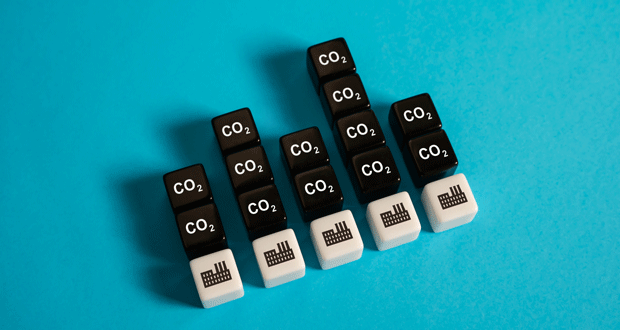 Hannah Dales of Churchill Group explains the critical role that FM firms have to play in supporting their supply chain with reducing emissions, from education to providing helpful templates and tools
Hannah Dales of Churchill Group explains the critical role that FM firms have to play in supporting their supply chain with reducing emissions, from education to providing helpful templates and tools
As the drive for sustainability accelerates, one of the biggest challenges facing businesses is addressing the indirect emissions that result from activities not owned or controlled by the reporting organisation. Known as ‘Scope 3’ emissions, this pollution often represents the largest portion of a company’s total carbon footprint.
Sustainability and social value metrics are becoming central to tender evaluations, especially in public sector contracts. Clients are increasingly seeking partners who demonstrate end-to-end responsibility for environmental performance. In this context, supporting suppliers to engage with sustainability is essential to remain competitive.
UNDERSTANDING THE CHALLENGE
Scope 3 emissions are notoriously difficult to quantify. They encompass a wide range of activities, from purchased goods and services to employee commuting, waste disposal, and even the use of sold products. For FM companies, this often means collecting emissions data from a diverse mix of service and product suppliers, many of whom may have never heard of “Scope 3”.
These smaller suppliers often face several barriers:
- Lack of expertise: Carbon accounting is complex, and most SMEs don’t have in-house sustainability teams.
- Limited resources: Time, money, and staffing constraints make it hard for them to prioritise emissions tracking.
- Confusion over expectations: Suppliers are often unclear about what data is needed, how to collect it, or why it matters.
This complexity can create a disconnect between FM providers and their supply chains. Without proactive engagement, it’s all too easy for smaller partners to disengage from the sustainability conversation, slowing down the industry’s collective progress.
TAKE THE LEAD
FM companies are well-placed to lead the charge in supporting every piece of the supply chain jigsaw puzzle in reducing its emissions. Our role as intermediaries between clients and service delivery partners means we can act as both educators and enablers, building sustainability capacity throughout the chain.
- Education is the foundation: Start with knowledge sharing. Many SMEs simply don’t know what Scope 3 is or how they fit into the picture. Hosting webinars, sharing bite-sized guidance materials, and running introductory sessions on carbon measurement can go a long way in raising awareness and demystifying sustainability expectations.
- Simplify the process: Make it easier for suppliers to participate by breaking down complex requests into manageable steps. Avoid technical jargon and provide templates or tools they can use to input data.
- Support, don’t berate: The relationship with suppliers should be supportive, not punitive. Rather than simply demanding emissions data, work with partners to build mutual understanding. Offer one-to-one support where possible and give suppliers space to ask questions and learn.
- Recognise and reward progress: Highlighting suppliers who are making strides in sustainability – whether through internal communications, case studies, or recognition schemes – helps to build momentum and show that change is both possible and appreciated.
- Embed sustainability into procurement: Long-term success means incorporating sustainability expectations into procurement processes. Include ESG criteria in supplier onboarding and ensure contracts reward innovation and transparency.
Overall, it’s important to communicate that taking steps to improve sustainability is also good for a business. Suppliers who invest in carbon tracking and reduction should see a tangible benefit when bidding for work, whether that’s with you or other contracts.
CHURCHILL GROUP’S SCOPE 3 SUPPLY CHAIN ENGAGEMENT PROJECT
We know this approach works because we’ve tested it ourselves. In 2023, Churchill Group launched a Scope 3 engagement project to begin the process of capturing and improving supply chain emissions data.
We started by engaging directly with our suppliers, focusing first on the top 80 contributing the most to Scope 3 emissions. Each supplier was asked to complete a tailored questionnaire to capture data on carbon reporting practices, sustainability commitments, and emissions reduction initiatives. We provided additional support for those unsure of how to respond, helping them understand how and why this information was needed.
This work helped us establish a much clearer picture of our Scope 3 footprint. But more importantly, it built stronger relationships with suppliers and sparked meaningful conversations about climate action. Many partners expressed appreciation for the guidance and transparency we provided, especially those engaging with carbon measurement for the first time.
We’re now using this data to identify common barriers across our supply chain and develop further tools to address them. Our goal is to move beyond reporting and towards active reduction, enabling our entire supply base to make meaningful progress on their sustainability journeys.
We’ve also just launched a bespoke decarbonisation resource hub to support our vendors in measuring and reducing their emissions. Tools include a Greenhouse Gas inventory calculator, a science-aligned target setting tool, step-by-step guidance and background materials.
BENEFITS FOR ALL
Reducing Scope 3 emissions may be complex, but through collaboration, open dialogue and top-down support, the FM sector can make a positive impact. The key lies in recognising that our supply chains are not passive participants, they are partners; if we want to meet net zero, every link in the chain must be empowered to move forward.





